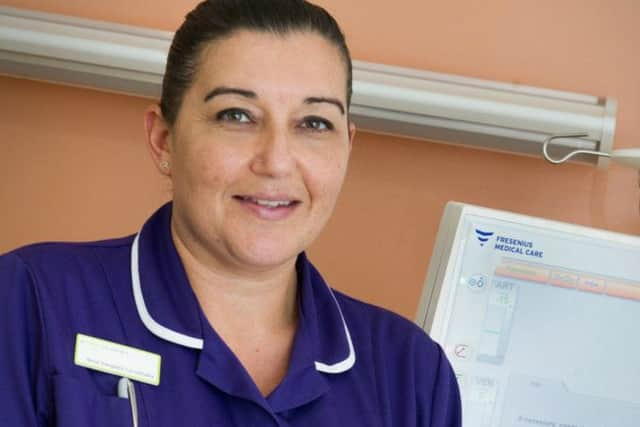Meet the nurse who is on a mission to save lives
and live on Freeview channel 276
In my three months as a transplant coordinator, I have quickly realised that no day is ever the same.
Our team of eight people responsible for renal transplants at St James’s University Hospital in Leeds are on call 24/7 to oversee the successful transplantation of kidneys for patients on the transplant waiting list in Yorkshire – meaning that if the phone goes at 3am, it’s a race against time to save the life of somebody who requires a life-changing transplant.
Advertisement
Hide AdAdvertisement
Hide AdWhen we receive that important call to say an organ has become available, there are several pieces of the puzzle that must fall into place before we can perform a successful transplant – from liaising with consultant surgeons and identifying a suitable patient match based on their tissue type to making fast contact with that patient and getting them to St James’s University Hospital as quickly as possible.


Leeds Teaching Hospitals NHS Trust (LTHT) is the regional centre for liver and kidney transplants which means that anyone in Yorkshire and Humber on the waiting list for either of these organs will come to St James’s University Hospital for transplant surgery. Last year, 166 patients received a kidney transplant at LTHT – that amounts to one nearly every other day.
As a transplant coordinator, I work closely with patients on the transplant waiting list to identify a suitable organ and set up the transplant process. Every organ is looked after by a different transplant coordinator – whether that’s kidney, liver, pancreas, heart or lungs – within renal, I can work with around 200 different patients and their families every month.
This involves assessing patients, establishing their suitability for a renal transplant, discussing treatment options, receiving referrals of potential organ donors, matching donor organs to suitable patients and ensuring the safe delivery of organs offered for transplant.
Advertisement
Hide AdAdvertisement
Hide AdI work alongside our Specialist Nurses in Organ Donation (SNODs as we call them) who refer potential organ donors to us and identify their eligibility to donate. In LTHT, 39 individuals donated organs after death in 2017/18. Between them they donated 120 organs – 75 of which were kidneys.
Before becoming a transplant coordinator in May this year, I worked as a SNOD for four years, meaning I have experienced the full process of organ donation from beginning to end, from supporting donor families in the decision to donate their loved one’s organs through to giving the gift of live to patients on the transplant waiting list.
Ensuring a successful transplant requires meticulous planning, organisation and communication. It’s a team effort involving scientists, surgeons, ward and outpatient staff, theatre staff, post-transplant teams, dialysis units, administrative support, SNODs and the National Organ Retrieval Service (NORS).
Communication between teams and patients is absolutely crucial in ensuring the many different stages in the process align and come together – from a suitable organ becoming available, the team being in place and ready to act fast, the availability of hospital beds, the patient being contactable and able to get to the hospital quickly. From the word go, it’s a military operation to coordinate.
Advertisement
Hide AdAdvertisement
Hide AdIt’s really rewarding to see lives saved and changed because of the altruism of organ donors and their families. But sadly, that is not always the case. The incredibly difficult part of the transplant coordinator role is losing patients who die while waiting for a transplant in Yorkshire. There are also occasions where, often due to health reasons, patients just aren’t suitable for transplant.
Losing patients is the hardest part of the role. Naturally, we grow close to our patients and their families through the journey and feel very passionate about doing everything possible to save and significantly improve their lives.
Along with the wider transplant team, our passion for organ donation sees us raising awareness both locally and on a wider platform such as the work we do with the Be A Hero Campaign and sporting events.
We feel compelled to do everything in our power to inspire as many people as possible to sign the organ donor register and consider their wishes with their loved ones. Without organ donors, our patients would simply not receive transplants.
It is Organ Donation Week this week so if you do anything at all, please sign the donor register.
For more information, please visit www.leedsth.nhs.uk/beahero/.